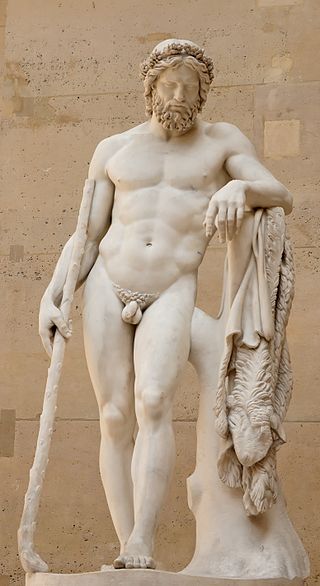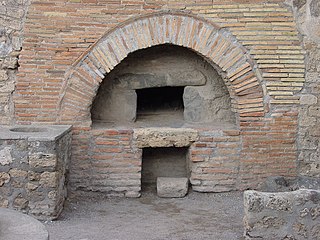
In the ancient Greek myths, ambrosia is the food or drink of the Greek gods, and is often depicted as conferring longevity or immortality upon whoever consumed it. It was brought to the gods in Olympus by doves and served either by Hebe or by Ganymede at the heavenly feast.

Semele, or Thyone in Greek mythology, was the youngest daughter of Cadmus and Harmonia, and the mother of Dionysus by Zeus in one of his many origin myths.

Agdistis is a deity of Greek, Roman, and Anatolian mythology who was a Hermaphrodite, having been born with both male and female reproductive organs. The deity was closely associated with the Phrygian goddess Cybele.

Aristaeus was the mythological culture hero credited with the discovery of many rural useful arts and handicrafts, including bee-keeping; he was the son of the huntress Cyrene and Apollo.

In Roman religion, Angerona or Angeronia was an old Roman goddess, whose name and functions are variously explained. She is sometimes identified with the goddess Feronia.
Orbona is the Roman goddess who protect parents who bereaved of their children and parents of ill children. The first mention of Orbona is unknown. She appears in the Arnobius Against The Heathen V4 written by Arnobius. Said Orbona is the goddess who takes care of parents who bereaved of their children. There is no description of the appearance or related presence in the Roman mythology. Orbona is a unique figure in Roman religion. She stands apart and does not derive directly from any Greek goddess. Her name is barely seen in the present because she has a particular role to protect only the father and mother who lose their child to death.
In ancient Roman religion, Strenua or Strenia was a goddess of the new year, purification, and wellbeing. She had a shrine (sacellum) and grove (lucus) at the top of the Via Sacra. Varro said she was a Sabine goddess. W.H. Roscher includes her among the indigitamenta, the lists of Roman deities maintained by priests to assure that the correct divinity was invoked in public rituals. The procession of the Argei began at her shrine.

Bees have been featured in myth and folklore around the world. Honey and beeswax have been important resources for humans since at least the Mesolithic period, and as a result humans' relationship with bees—particularly honey bees—has ranged from encounters with wild bees to keeping them agriculturally. Bees themselves are often characterized as magically imbued creatures and their honey as a divine gift.
Nenia Dea was an ancient funeral deity of Rome, who had a sanctuary outside the Porta Viminalis. The cult of Nenia is doubtless a very old one, but according to Georg Wissowa the location of Nenia's shrine (sacellum) outside the center of early Rome indicates that she didn't belong to the earliest circle of Roman deities. In a different interpretation her shrine was located outside the old city walls, because it had been the custom for all gods connected to death or dying.

Murcia was a little-known goddess in ancient Rome. Her name occurs as an epithet of Venus.
In ancient Roman religion, the indigitamenta were lists of deities kept by the College of Pontiffs to assure that the correct divine names were invoked for public prayers. These lists or books probably described the nature of the various deities who might be called on under particular circumstances, with specifics about the sequence of invocation. The earliest indigitamenta, like many other aspects of Roman religion, were attributed to Numa Pompilius, second king of Rome.
The Molae are goddesses who appear in an ancient Roman prayer formula in connection with Mars. The list of invocations given by Aulus Gellius pairs a god's name with a feminine nominative noun that personifies a quality or power of the god (Moles Martis, "Moles of Mars"). These pairings are often taken as "marriages" in the anthropomorphic mythological tradition. An inscription records a supplicatio Molibus Martis, supplication for the Moles of Mars.
Cornelius Labeo was an ancient Roman theologian and antiquarian who wrote on such topics as the Roman calendar and the teachings of Etruscan religion (Etrusca disciplina). His works survive only in fragments and testimonia. He has been dated "plausibly but not provably" to the 3rd century AD. Labeo has been called "the most important Roman theologian" after Varro, whose work seems to have influenced him strongly. He is usually considered a Neoplatonist.
Agenoria is a Roman goddess of activity (actus). Her name is presumably derived from the Latin verb agō, "to do, drive, go"; present participle agēns. She is named only by Augustine of Hippo, who places her among the deities who are concerned with childhood. She is thus one of the goddesses who endows the child with a developmental capacity, such as walking, singing, reasoning, and learning to count. W.H. Roscher includes Agenoria among the indigitamenta, the list of deities maintained by Roman priests to assure that the correct divinity was invoked for rituals.

Lateranus is an ancient Roman tutelary god of hearths (foci) and a Genius of brick ovens, according to a satirical passage in the Christian writer Arnobius:
Lateranus, as you say, is the god and genius of hearths, and received this name because men build that kind of fireplace of unbaked bricks. What then? if hearths were made of baked clay, or any other material whatever, will they have no genii? and will Lateranus, whoever he is, abandon his duty as guardian, because the kingdom which he possesses has not been formed of clay? And for what purpose, I ask, has that god received the charge of hearths? He runs about the kitchens of men, examining and discovering with what kinds of wood the heat in their fires is produced; he gives strength to earthen vessels, that they may not fly in pieces, overcome by the violence of the flames; he sees that the flavour of unspoilt dainties reaches the taste of the palate with their own pleasantness, and acts the part of a taster, and tries whether the sauces have been rightly prepared.

Bhramari is the Hindu goddess of bees. She is an incarnation of the goddess Mahadevi in Shaktism.









